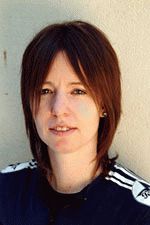AVIVA-Berlin >
Interviews
AVIVA-BERLIN.de im Dezember 2025 -
Beitrag vom 06.07.2005

Et Sheaava Nafshi - Keep Not Silent
Sharon Adler
Three women fight for their right to love within their beloved Orthodox communities in Jerusalem. AVIVA-Berlin asks Israeli director Ilil Alexander about the making of her debut documentary.
Winner of the Israeli Oscar for Best Documentary 2004, winner of the Gerhald-Klein-Publikums-Preis" of the 11th Jewish Film Festival Berlin & Potsdam, and also nominated for the Best International TV Film by the British Academy at this yearôÇs Grierson Awards, ôÇKeep Not SilentôÇ is a remarkably bold and poignant film about the struggle of three women fighting for their right to love. Miriam-Ester, Ruth and Yudith are pious, religiously committed Orthodox Jews. They are also lesbians and members of a secret support group called the "Ortho-dykes".
In the Orthodox Jewish religion, homosexuality is forbidden. Using hidden webcams, and extraordinary cinematic techniques to protect the anonymity of the women so that they can continue to live in their Orthodox communities in Jerusalem, the three women tell us about their lives and the high price they have to pay through their commitment to confronting their duality.
Keep Not SilentôÇ reveals the excruciating pain of constant self-suppression of the women, and also their profound compassion toward their society. Miriam-Ester fights her aversion to a manôÇs touch for the sake of her family and ten children, while RuthôÇs husband shockingly permits his wife to see her female lover twice a week. Yudith, a RabbiôÇs daughter, declares her sexuality openly because she firmly believes "lies are the worst sin on earth." The womenôÇs courageous fight for self-realization, honesty and acceptance is an extraordinary model for those who struggle with issues of religious and sexual identity.
ôÇKeep Not SilentôÇ is Ilil AlexanderôÇs first feature documentary. She worked as a freelance director and producer for Israeli television after graduating from Tel-Aviv University Film School with Honours five years ago.
She produced and directed The International Student Film Festival (the largest of its kind, with 52 countries participating), The Los Angeles/Tel-Aviv Master Class Producers Workshop, The International Market for Israeli Documentaries as well a variety of projects for both film and television including the TV Election Campaign for the Workers Party. Since 2001, she has been a Board member of AIDF (Association of Israeli Documentary Filmmakers), promoting Israeli documentaries and original Israeli filmmaking while leading the publicôÇs struggle against political control of the public Israeli TV Channel.
AVIVA-Berlin: Congratulations!!
|  |
Ilil Alexander |
You have just won the "Gerhald-Klein-Publikums-Preis" of the 11th Jewish Film Festival Berlin & Potsdam, and you will receive 2.000 Euros prize money. How do you feel about getting the "Audience Award" in Berlin? Especially after you were the winner of the Israeli Academy Award for Best Documentary?
Ilil Alexander: I feel great, I mean. No other one is more important for me than the audience. It is not the taste of a few industry people, it is the audience. They really loved the characters - it is the most important thing in making the film. I am very happy, and my women in the film are even much happier then me. I just got an e-mail of one of the women, Miriam Ester, and she wrote that she cannot wait to hear more about the German prize. "Write me, write me", she said.
AVIVA-Berlin: It took you four long years to make this extraordinary film. How do you feel now that itôÇs finished? Was it hard for you to let go?
Ilil Alexander: I am really relieved. Much more it is not like the awards excite me, but I am just realising that this film is done. And that it is like a flame with fire. I tried to use cinema to hide people. Documentary cinema is actually made to reveal. It really felt for four years like I am fighting something that I couldnôÇt win. But for me the all thing is the fact that the film is out there and that it is working and that it gets audience awards all over the world. It is amazing. It means that a miracle happened there. It is amazing to witness a miracle because I could never believe that. I feel to come out of it. I felt like I was playing with a lot of peopleôÇs money and maybe with my own emotions and expectations and I was very afraid that I wouldnôÇt be able to make something they would really love that could work. It is just a miracle.
And I probably do my next project. There is so much more to do.
AVIVA-Berlin: Tell us more about your next project.
Ilil Alexander: Well, I am doing three different projects. One of them is about domestic violence in Israel. ItôÇs about a group of men that are trying to go through therapy and control their violent tendencies. And I am shooting another film where I am hoping to find actually a partner in Germany for that. I am doing a film about a Tibetan servant who used to be the servant of one of the most important Tibetan leaders in the world. The Dalai Lama made him the leader of the reincarnation, for the search, for the master. And he is such an amazing character. This is another example by the way, of an amazing person full of love and beliefs. Very honest. Very sincere. With so much dignity and integrity that the only thing you want to do is to hug him and to help him to find what ever he is searching for. And another project is about Jewish subjects and it is actually in such an early state that I cannot say anything about it now.
AVIVA-Berlin: Are you also a member of "Women Make Movies"?
Ilil Alexander: I am not a member but they are my distributors. They distribute my film in North America. I have the same agent world-wide which is based in Amsterdam, in New York and Canada. And for North America, the rights of distributions have "Women Make Movies". It is a film made by a women and about women and I wanted to empower this organization.
AVIVA-Berlin: We talked about your future projects and goals. What are you dreaming about doing? So what do you want to realise badly more than anything else?
Ilil Alexander: (sighs thoughtfully) Well, I donôÇt know. I want this project to get to as many people as possible and to really be able to change the prospective about the world and about specific issues that I am dealing with. And I just hope to go on and stay a filmmaker and also like I have been a student in the last 14 years at Television University. So I hope I will stay student for the next 14 years. That is really what I hope.
AVIVA-Berlin: When you talked to the audience during the showing of the film at Jewish Film Festival Berlin you said that getting the money for the production was easy, but that you didnôÇt have a clue where it would lead to for a very long time. How did you deal with this uncertainty?
Ilil Alexander: It was a story I had to tell and those were voices that had to be heard that never dared before to have their voices heard. As a woman I totally identified with them and I became quite obsessed with winning this impossible fight of making a documentary film by hiding the main characters instead of revealing them as the cinema demands. I just could not help it.
AVIVA-Berlin: How could you get so close to the women who took part in the documentary - Miriam-Ester, Yudith and Ruth?
Ilil Alexander: I think we just fell in love. There was something about me specifically and them specifically that we just really felt in love with each one of them. There was something there that really worked - a kind of chemistry. And I got patience and I also dared. It grew and grew so they really trust me. Our friendship grew and grew. I was really lucky that they trusted me. And I knew that I wouldnôÇt do anything that would really hurt them. It was like a bond because they knew I will never use the film in a way that will hurt them. We were like partners for this road. It wasnôÇt like my film that they can just take part of it was our project. The fact that I came from the outside and I could totally accept the way they are. It really made this bond between us very unique. As much as I needed something from them, as much as I needed their participation in the project they also needed me to break the lonely moments and to break the loneliness in some way and also to have someone who can really understand them maybe more then some of their friends in their community.
Fortsetzung